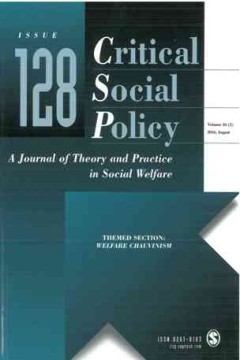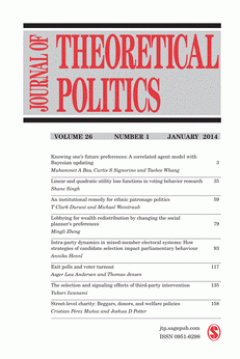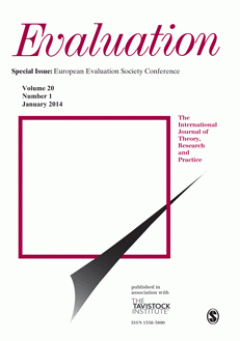Filter by

Low road or high road? The post-crisis trajectory of Irish activation
Comparatively slow in adopting any clear activation strategy, post-crisis Ireland crossed the Rubicon and rapidly took steps to implement a work-first labour activation strategy. The article maps and examines the interaction of three variables – ideational influences, political interests and institutional processes – to assess the nature of post-crisis Irish activation policy. Troika im…
- Edition
- Volume 36, Issue 3, August 2016; pp. 432–452
- ISBN/ISSN
- 02610183
- Collation
- -
- Series Title
- Critical Social Policy
- Call Number
- -

Neoliberal paternalism and paradoxical subjects: Confusion and contradictio…
The twin thrusts of neoliberal paternalism have in recent decades become fused elements of diverse reform agendas across the advanced economies, yet neoliberalism and paternalism present radically divergent and even contradictory views of the subject across the four key spaces of ontology, teleology, deontology and ascetics. These internal fractures in the conceptual and resulting polic…
- Edition
- Volume 36, Issue 3, August 2016; pp. 412–431
- ISBN/ISSN
- 02610183
- Collation
- -
- Series Title
- Critical Social Policy
- Call Number
- -

Bordering practices in the UK welfare system
This article considers how chauvinistic welfare policies operate as a bordering practice. Taking the UK as an example, it examines a process in which welfare provisions have increasingly been withdrawn from a group of people designated as undeserving. It points out a close link between chauvinism based on ethnicity and that based on class. This relation is explored in detail for the cas…
- Edition
- Volume 36, Issue 3, August 2016; pp. 391–411
- ISBN/ISSN
- 02610183
- Collation
- -
- Series Title
- Critical Social Policy
- Call Number
- -

Populist radical right protectors of the folkhem: Welfare chauvinism in Sweden
The article scrutinises a version of welfare chauvinism taking shape in Sweden, by concentrating on the concept of folkhem (the [Swedish] people’s home), and examines how it was expressed in the 2010–2014 parliamentary activity of the Sweden Democrats. It offers an analysis of how the welfare chauvinism project is first contextualised in the party documents, and subsequently articulated…
- Edition
- Volume 36, Issue 3, August 2016; pp. 371–390
- ISBN/ISSN
- 02610183
- Collation
- -
- Series Title
- Critical Social Policy
- Call Number
- -

From welfare nationalism to welfare chauvinism: Economic rhetoric, the welf…
The article analyses the role and effects of economic cost and welfare state arguments in Finnish immigration politics and policies. It argues for a need to distinguish between welfare nationalist, welfare chauvinist and welfare exclusionist discourses. Through an examination of the immigration programmes of the political parties and parliamentary debates and policy documents mapping the ch…
- Edition
- Volume 36, Issue 3, August 2016; pp. 352–370
- ISBN/ISSN
- 02610183
- Collation
- -
- Series Title
- Critical Social Policy
- Call Number
- -

Deservingness in the Danish context: Welfare chauvinism in times of crisis
This article examines categories of deservingness in social policy. It argues that immigrant groups are positioned differently according to their status and perceived ‘value’ for society. On the one hand, most states need several types of migrant labour; on the other hand, they wish to limit other types of migrants. The balance between humanitarian obligations and this urge to control has…
- Edition
- Volume 36, Issue 3, August 2016; pp. 330–351
- ISBN/ISSN
- 02610183
- Collation
- -
- Series Title
- Critical Social Policy
- Call Number
- -

The politics and policies of welfare chauvinism under the economic crisis
The ongoing economic crisis that emerged in the wake of the global recession in 2008, and was followed by the more recent crisis of the Eurozone, has introduced new themes and remoulded old ways of approaching the welfare state, immigration, national belonging and racism in Northern Europe. This article identifies two main ways of understanding welfare chauvinism: 1) as a broad concept …
- Edition
- Volume 36, Issue 3, August 2016; pp. 321–329
- ISBN/ISSN
- 02610183
- Collation
- -
- Series Title
- Critical Social Policy
- Call Number
- -

Simulating policy diffusion through learning: Reducing the risk of false posi…
This article uses agent-based computer simulation to investigate the dynamics of policy diffusion through learning. It compares these dynamics across state systems in which policy-makers possess different capabilities to learn about policy effectiveness: independent decision-makers focusing on own experiences vs. interdependent social learners relying heavily on experiences of others. The…
- Edition
- Volume 28, Issue 3, July 2016; pp. 497–519
- ISBN/ISSN
- 0951-6298
- Collation
- -
- Series Title
- Journal of Theoretical Politics
- Call Number
- -

Political autonomy and independence: Theory and experimental evidence
We use a game-theoretical model and results from laboratory experiments to study the process by which subordinated regions of a country can obtain a more favorable political status. In our theoretical model a dominant and a dominated region first interact through a political process. This process involves two referenda, one at the level of the country as a whole and one at the level of …
- Edition
- Volume 28, Issue 3, July 2016; pp. 461–496
- ISBN/ISSN
- 0951-6298
- Collation
- -
- Series Title
- Journal of Theoretical Politics
- Call Number
- -

Time constraints and the opportunity costs of oversight
In a principal–agent relationship, how should principals budget time for oversight when oversight activity is not instantaneous? We develop a formal model of resource allocation by a principal monitoring multiple agents, where the principal faces a dynamic budgeting problem. Our model reveals a tension between the value of holding resources in reserve to maintain the threat of an audit …
- Edition
- Volume 28, Issue 3, July 2016; pp. 431–460
- ISBN/ISSN
- 0951-6298
- Collation
- -
- Series Title
- Journal of Theoretical Politics
- Call Number
- -

Strategic party heterogeneity
Political parties field heterogeneous candidates and send a variety of messages about their policy positions. Yet most voting models maintain that office-seeking parties should enforce intraparty homogeneity and cultivate clear party reputations. This article reconciles theory with reality by identifying a strategic rationale for parties to pursue heterogeneity. I develop a model in which…
- Edition
- Volume 28, Issue 3, July 2016; pp. 408–430
- ISBN/ISSN
- 0951-6298
- Collation
- -
- Series Title
- Journal of Theoretical Politics
- Call Number
- -

Heresthetics and choice from tournaments
Moser et al. provide a formalization of heresthetics, the “art of political strategy”, in collective choice settings. In doing so they introduce the heresthetically stable set as the set of outcomes least susceptible to manipulation of issue dimension. In this note we correct a small error in the original paper, and close several open questions asked there in. We examine the heresthetical…
- Edition
- Volume 28, Issue 3, July 2016; pp. 385–407
- ISBN/ISSN
- 0951-6298
- Collation
- -
- Series Title
- Journal of Theoretical Politics
- Call Number
- -

Scope and precedent: judicial rule-making under uncertainty
I develop a formal model of Supreme Court opinion-writing in an environment of uncertainty. In particular, the model captures how the Supreme Court will optimally design the specificity of its legal rules. The model focuses on the tradeoff between more precise rules which are controlling in a smaller subset of cases against less precise rules, which have wider applicability but yield le…
- Edition
- Volume 28, Issue 3, July 2016; pp. 353–384
- ISBN/ISSN
- 0951-6298
- Collation
- -
- Series Title
- Journal of Theoretical Politics
- Call Number
- -

Social choice and popular control
In democracies citizens are supposed to have some control over the general direction of policy. According to a pretheoretical interpretation of this idea, the people have control if elections and other democratic institutions compel officials to do what the people want, or what the majority want. This interpretation of popular control fits uncomfortably with insights from social choice …
- Edition
- Volume 28, Issue 2, April 2016; pp. 331–349
- ISBN/ISSN
- 0951-6298
- Collation
- -
- Series Title
- Journal of Theoretical Politics
- Call Number
- -

Do parties converge to the electoral mean in all political systems?
Many formal models suggest that parties or candidates should locate at the electoral mean. Yet, there is no consistent evidence of such convergence across political systems. Schofield’s (2007) Valence Theorem proves that when valence differences across parties are large, there is non- convergence to the mean. Convergence to the mean depends on the value of the convergence coefficient, c.…
- Edition
- Volume 28, Issue 2, April 2016; pp. 288–330
- ISBN/ISSN
- 0951-6298
- Collation
- -
- Series Title
- Journal of Theoretical Politics
- Call Number
- -

An empirical stochastic model of Argentina’s Impossible Game (1955–1966)
Argentine politics from 1955 to 1966 was characterized by the conflict between the Peronists and the anti-Peronists. While each camp could veto the other’s project, neither could advance their own agenda. In his canonical interpretation, O’Donnell (Modernization and Bureaucratic- Authoritarianism. Berkeley, CA: Institute of International Studies, University of California, 1973) concluded…
- Edition
- Volume 28, Issue 2, April 2016; pp. 266–287
- ISBN/ISSN
- 0951-6298
- Collation
- -
- Series Title
- Journal of Theoretical Politics
- Call Number
- -

Increasing rents and incumbency disadvantage
Recent empirical studies have found a incumbency disadvantage in many developing democracies, in marked contrast with the well-known incumbency advantage in the US and other developed democracies. We know considerably less about incumbency disadvantage than incumbency advantage. In a simple principal-agent framework, I explore the role of a prominent feature of developing democracies – …
- Edition
- Volume 28, Issue 2, April 2016; pp. 225–265
- ISBN/ISSN
- 0951-6298
- Collation
- -
- Series Title
- Journal of Theoretical Politics
- Call Number
- -

Distributive politics, the electoral connection, and the antebellum US Congre…
We investigate the rise of federal military pensions in the antebellum US Congress to examine whether key aspects of the contemporary electoral connection were present in earlier historical eras. Overall, the political responses of members of Congress to pressures for military service pensions reveal that the quest for credit-claiming opportunities significantly shaped the adoption and ev…
- Edition
- Volume 28, Issue 2, April 2016 ; pp. 192–224
- ISBN/ISSN
- 0951-6298
- Collation
- -
- Series Title
- Journal of Theoretical Politics
- Call Number
- -

Exploring ethical issues and conditions for institutionalizing evaluation i…
When addressing evaluation ethics, both the literature and existing ethics codes focus on evaluators’ conduct. This risks undermining the evaluator’s position vis-ŕ-vis programme managers and evaluation commissioners, without addressing major ethical issues. This study indicates that the factors influencing ethical choices include institutional settings and organizational arrangements. …
- Edition
- Volume 22, Issue 2, April 2016; pp. 149–167
- ISBN/ISSN
- 13563890
- Collation
- -
- Series Title
- Evaluation
- Call Number
- -

A framework for improving the responsiveness of policy through development …
Development evaluation, which prioritizes poverty reduction, potentially can increase the responsiveness of policy to poor people. Power imbalances, however, mean that although development evaluation has the possibility to be an important contributor to poverty reduction efforts, the interests of the poor are often excluded from the process of evaluation. In this article a framework tha…
- Edition
- Volume 22, Issue 2, April 2016; pp. 245–258
- ISBN/ISSN
- 13563890
- Collation
- -
- Series Title
- Evaluation
- Call Number
- -
 Computer Science, Information & General Works
Computer Science, Information & General Works  Philosophy & Psychology
Philosophy & Psychology  Religion
Religion  Social Sciences
Social Sciences  Language
Language  Pure Science
Pure Science  Applied Sciences
Applied Sciences  Art & Recreation
Art & Recreation  Literature
Literature  History & Geography
History & Geography